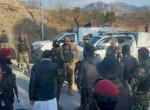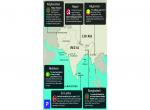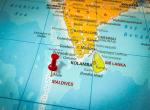Following the resignation of NCP-UML Prime Minister Jhala Nath Khanal the Constituent Assembly (CA) met in Kathmandu on October 28, 2011 and elected Maoist leader Dr. Baburam Bhattarai as the 4th Prime Minister since 2008 when the country was declared a Republic. Dr. Bhattarai and MPRF (D) leader Bijaya Kumar Gachhadar were administered the oath of office as Prime Minister and Deputy PM respectively by the President on Aug. 29, 2011. Dr. Bhattarai is the second Maoist leader after Prachanda to assume this responsibility. The other two Prime Ministers in this phase were Madhav Nepal and Khanal both belonging to NCP-UML. For the record, the second largest of the three main parties in the CA, the Nepali Congress (NC), despite having put up Ram Chandra Paudel for the umpteenth time as their Prime Ministerial candidate, failed to win the coveted post once again.
Dr. Bhattarai massive win, securing 340 votes against 235 polled by the NC-UML backed candidate, was facilitated through a last minute deal between the Maoist and the Madhesi leaders arrived at just a few hours before the voting. According to reports, the 4-point agreement between them was signed by the Maoist Chairman Pushp Kamal Dahal ‘Prachanda’ and leaders of the United Democratic Madhesi Morcha comprising the Madhesi People’s Rights Forum-Democratic (MPRF-D) led by Bijaya Kumar Gachhadar, Tarai Madhesh Democratic Party (TMDP) of Mahantha Thakur, Sadhbhavana Party under Rajendra Mahato, Madhesi People’s Rights Forum-Republican (MPRF-R) led by J P Gupta and Tarai Madhesh Democratic Party (Nepal) led by Mahendra Prasad Yadav. The agreement was announced at a joint press conference just before the election and provides for determination of the number of Maoist combatants to be integrated into the Nepal Army, their duties, units under which the integration would take place, rehabilitation package for the rest and handing over of weapons etc. Other reports suggest that the numbers could be as high as 7,000 against 5-6000 that the NC-UML combine was earlier willing to concede. On the issue of establishment of State Restructuring Commission it was said that this would be looked into by the CA’s committee debating this. Other points in the deal relate to withdrawal of pending criminal cases against Maoist and Madhesi Morcha leaders/ carders and resolution of all outstanding bilateral issues with neighbouring countries.
As expected, NC and UML leaders have taken ‘serious exception’ to the deal accusing the UCPN (Maoist) and Madhesi leaders of ‘breaching’ and ‘backtracking’ on the previous pacts and agreements signed by the political parties. They described it as ‘flawed’ and ‘controversial’. They confirmed their decision to play the role of strong and watchful opposition. They also resolved not to join the government
From an initial reading of the 4-point agreement along with the stated position of the Maoist leadership, it would appear that the Madhesi parties might get significant concessions from the Maoists on their crucial demands relating to federalism, identity, inclusiveness, sharing of resources, recruitment in government jobs including in the Nepal army. Even though an independent State Restructuring Commission may not be established, the Madhesi agenda could well be included in the draft on this issue to be prepared by the committee of the Constituent Assembly. There are also indications that some specific legislation may be quickly brought in within the next 15 days to begin the process of recruitment as also some financial reforms in the fiscal budget to be presented by the new government shortly. These would obviously enhance the comfort level of the Madhesi parties.
The Maoists would obviously hope to benefit from the deal since they have, perhaps, got the last chance in this phase of political machinations to promote their agenda on integration/rehabilitation and also push through the incorporation of their ideological concepts in the constitution that would include key elements from the concepts of people’s/socialist democracy championed by them.
As regards the formation of the full cabinet, it is understood that the Madhesi parties would be able to finalise their representatives for the 11 berths being offered to them with MPRF-D getting 4 seats, MPRF-R, TMDP and TMDP-Nepal getting 2 each. Sadbhavana Party of Rajendra Mahato is likely to get 1 cabinet berth. It is also understood that apart from Home Ministry already assigned to the MPRF-D leader Gachhadar, the Madhesi parties may get some other important portfolios like Information and Communication, Energy, Planning, Tourism and Civil Aviation and Local Development. According to Madhesi sources the Defence portfolio may also be assigned to them but there is an element of doubt on this since the Maoists may not like to let both Home and Defence go out of their control.
Even though it was generally expected that the Maoists would by and large, retain their ministers from the Khanal cabinet, intense debate is going on between contenders belonging to the different factions for inclusion. They too are, however, expected to resolve the issue and go for the swearing in of their 15 ministers on Tuesday. Understandably, Dr. Bhattarai’s wife Hisila Yami who was a minister in the previous cabinet would stay out. .
Recognizing the urgency of the fact that the term of the CA is due to expire on Aug. 31, 2011, immediately after the swearing of the cabinet, a motion was moved in and approved by the CA by 537 of the 541 members present to extend its term by another 3 months. During this limited time aperture the priority task for the new government would be to get cracking to resolve the two contentious issue of integration and rehabilitation of the Maoist combatants, implementation of the peace accord and, most importantly, finalize the position on the 87 odd points in the draft constitution that has defied resolution for so long.
The crucial challenge before the new government will be whether it will be able to do all this and finally open the way for stability and governance to return to the country. The Maoists and the Madhesi partners in the coalition could well be looking for some real hard bargaining and brinkmanship in the months ahead. It is only hoped that eventually the political parties would approach the challenges in a spirit of ‘positive reconciliation’ to end years of uncertainty that has bogged the country. Dr. Bhattarai will have to draw deep on his political skills to provide an enlightened leadership to achieve reconciliation that the three previous governments could not do.
----------------------------------------------
Published Date: 1st September, 2011









Post new comment